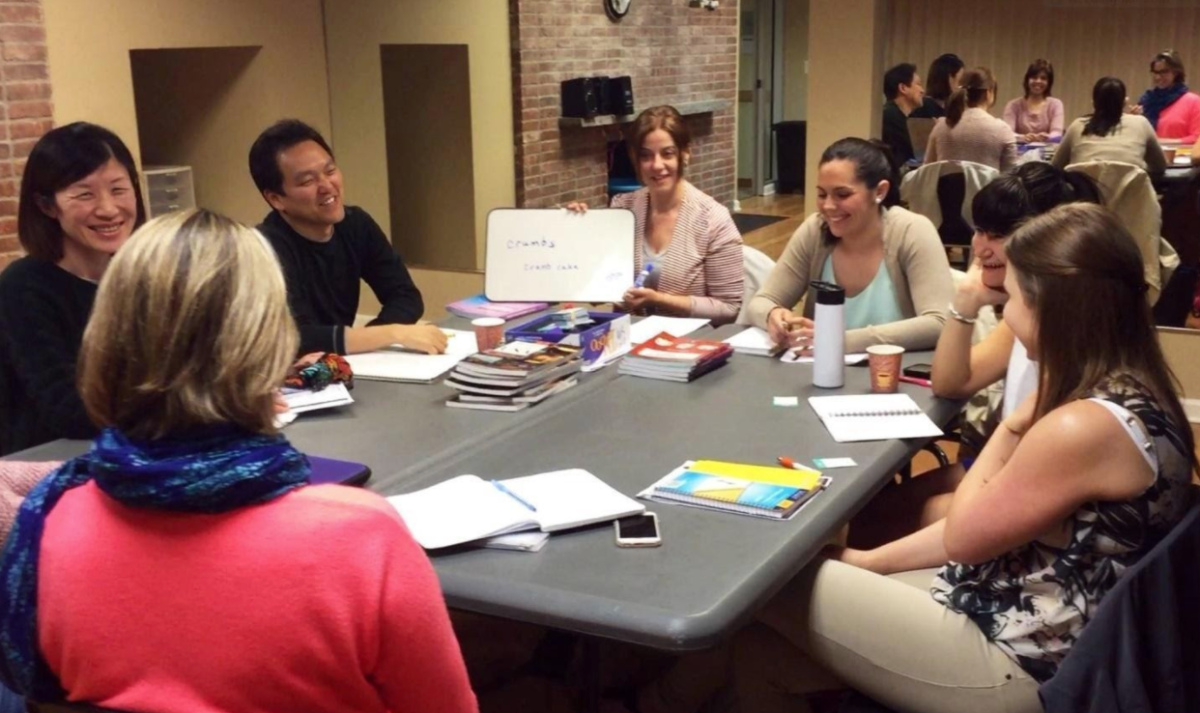Imagine you are an immigrant who has arrived in the United States. You do not know how to communicate in English, and as a result, you are not able to fully integrate yourself into American society. One day, you learn about the English as a Second Language classes being offered at a local nonprofit organization, The Connection in Summit, New Jersey. Once there, you discover a warm community that welcomes you with open arms.
As the organization’s name suggests, its mission is to connect people from an array of backgrounds through a variety of programs, from after-school enrichment for children to fitness classes for adults. The community service division is dedicated to providing assistance to those who need it most, such as ESL students. Wendy Graeb, the organization’s executive director, describes the ESL program as being at the heart of the nonprofit. “It is absolutely the jewel in the crown…for what we believe, [what] we exist for, and our mission of serving others,” she said.
The ESL program began in 1945 and is still operating to this day. For nearly 19 years, it thrived under the direction of Jane Walbridge, who retired last fall. “People are always going to come to the United States for a new life, for new English skills, and so we always have people coming, who always need our help, who always need our welcome and compassion,” she said. According to Walbridge, the ESL classes benefit community members in multiple ways. “We actually help people increase their salary…we also help people navigate the healthcare system sometimes, and we prepare them for job interviews, and we prepare them for the citizenship test.”
Many people first hear about the program through word of mouth. When Walbridge was the director, she also took it upon herself to spread the word. “I literally put flyers up in the stores that the people whose first language isn’t English frequent,” she said. To take ESL classes, one must pay the annual adult membership dues, but scholarships are available to those who cannot afford the fee. “Part of our stated mission is that no one should be denied participation based on who they are or what their economic situation is,” said Graeb.
ESL students come from all over the world. Au pairs, young people who move to the United States to take care of a family’s children and receive a salary in return, find the classes particularly useful. They are required to study English in America, and during the 2009 financial crisis, the ESL program “had many, many au pairs from Europe because the European economy was so bad, [and] these young people couldn’t get jobs,” Walbridge said. Adults with children enrolled in local schools benefit from the program’s services, as well. “If the children come home with homework and it’s in English, when you speak a different language, you can’t help the way that you would want to,” said Graeb.
All the ESL instructors, whether they are high schoolers or retired teachers, donate their time to help adults learn English, but they do much more than that. “They help people understand our culture, the way that we function,” said Graeb. After he retired, John Millspaugh served as an ESL teacher in China and was inspired to continue teaching once he returned to the States. He has been an ESL instructor with the program for the past 11 years. “Some people, when they retire, they complain that they’re bored, and they missed their job. I have never missed my job, and this is so much more fun,” he said.
Instructors are not required to have a deep knowledge of the intricacies of the English language, and they are allowed to choose curriculum materials and prepare their own lesson plans. “More important than past perfect tense is to have [the] student feel that they can risk making a mistake in class,” said Walbridge. Different instructors will utilize different teaching styles; for instance, Millspaugh focuses his classes on conversation. “I spend part of the class just asking everybody what’s new in their life, and I try to get them to share things that are good and bad because if they can share things that are not going well, then we can get closer and help each other,” he said.
Other teachers take advantage of their unique backgrounds, as Walbridge described in an anecdote about two past instructors. “One had a Ph.D. in mathematics, and [the other] one had a master’s degree in literature, and they taught the same people…The mathematics teacher taught grammar…and the other teacher used poetry and stories to get people to talk…I tried to match what would make a student comfortable with what made the teacher comfortable.”
When the COVID-19 pandemic forced the U.S. into lockdown last spring, the ESL classes moved online. The number of instructors went from about 40 to 15, and the student population shrunk, but that did not stop volunteers from adapting their teaching for Zoom, Walbridge said. “We’ve been very fortunate at The Connection to always have enough volunteers. It’s an amazing testament…to the community; so many people are willing to volunteer, to help other people.”
The Zoom classes have, in effect, become a lifeline for students. “They’re not going out, they’re not seeing anyone else. If you’re here from a different country without any family, your Zoom class is your connection to a community,” said Walbridge. For Jelena Daugste, one of Millspaugh’s students, learning ESL in a virtual environment has been especially valuable to her amidst the ongoing pandemic. Since she is a social person, she said that the ESL classes have allowed her to “communicate with people from different countries with different cultures.”
Towards the end of last year, the program gained a new director, Moona Elsevier, who began as an ESL teacher in March 2019. She brings with her an understanding of the situation many ESL students find themselves in. “I’m an immigrant myself. I was born in Iran and came here [at a] very young [age]…so I know firsthand how not knowing [English] impacts the experience of the entire family.” Elsevier also recognizes how vital the ESL program is to its students. “To see people of different nationalities going through the same thing, you don’t feel so alone,” she said.
When asked why she thinks the ESL program means so much to students and teachers, Elsevier answered immediately. “I think it’s Jane. I don’t know of anybody with a bigger heart, and I think that the warmth and understanding and patience that she brings to the program just completely colored every aspect of it.” Granted, Elsevier has some big shoes to fill. As she said, “Jane did such a great job creating…this really warm, inviting, inclusive community…I’m going to be leaning on her a lot.” Nevertheless, she already has a few ideas up her sleeve.
Before she became director of the program, Elsevier taught beginner students, many of whom would not consistently attend class due to numerous circumstances, such as bad weather, conflicting work schedules, or having to spend time with the kids after school. When classes return to an in-person environment, Elsevier would like to continue to hold the Zoom lessons. Furthermore, she is entertaining the idea of holding a virtual conversation club, “where you just sit…for 45 minutes and talk…so they have more days during the week where they’re practicing English.”
Elsevier would like to add a new department to the program, as well. “I would love to get a grant or funds to create a tiny little department for people who need help with…how to enroll your kids in school…how to register for things, how to apply for a job, how to fill out documents. I think if I could implement that, in addition to teaching [students] how to speak English, then it could take care of a lot of their needs.” Ultimately, Elsevier aims to “help the immigrant as a whole,” and she plans to do just that in the months and years to come.
The ESL program has had a tremendous impact on students. One woman was able to complete her GED, having never finished high school in Mozambique. Another student was able to work her way through graduate school to obtain her master’s degree in behavioral training and transition to a career where she works with autistic children. In addition, Walbridge shared the story of one special student who was a part of the program.
“There was this one man…he was there right as I started. We were sitting together at a December holiday party, and he said when he couldn’t make a joke in English…he felt so lonely…and then, he started to learn [English], and then, he started to joke, and we liked each other because I use humor to cope, too….and then, he left [and] got a job, and he came back, ten [or] twelve years later when he was actively dying…he wanted to come back to his Connection family to come to ESL class for the last six weeks that he was able to leave the house.”
The ESL classes truly are a haven for students. For Walbridge, a quote by English writer G.K. Chesterton has always remained at the forefront of her mind when it comes to describing the program: “‘There are no words to express the abyss between isolation and having one ally. It may be conceded to the mathematician that four is twice two. But two is not twice one; two is two thousand times one.’”




